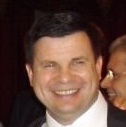By Bob Allen
A Russian Baptist leader has voiced concern about recent legislation by Congress authorizing $350 million in lethal and nonlethal military assistance to Ukraine and expanding the president’s authority to impose sanctions on Russian energy and defense firms.
 Vitaly Vlasenko, director the department for external church affairs for the Russian Union of Evangelical Christians-Baptists, said in a letter published by media that Russian Baptists “are deeply concerned” about intensifying conflict in the Ukraine.
Vitaly Vlasenko, director the department for external church affairs for the Russian Union of Evangelical Christians-Baptists, said in a letter published by media that Russian Baptists “are deeply concerned” about intensifying conflict in the Ukraine.
In December President Obama signed the Ukraine Freedom Support Act of 2014, passed unanimously by the Senate on Dec. 11. The bill was co-authored by U.S. Senator Bob Corker (R-Tenn.), chairman of the Senate Foreign Relations Committee, and New Jersey Sen. Robert Menendez, the ranking Democrat on the committee.
The act established as U.S. policy “to further assist the government of Ukraine in restoring its sovereignty and territorial integrity to deter the government of the Russian Federation from further destabilizing and invading Ukraine and other independent countries in Central and Eastern Europe, the Caucasus and Central Asia.”
Vlasenko, in a letter published by Gazeta Protestant, a Protestant newspaper in Russia, said he fears the legislation signals “a serious military escalation.”
“It appears to give hardline-thinkers a green light,” Vlasenko said.
Vlasenko said the November U.S. general election left the impression that the “American populace is becoming more aggressive,” adding that “It pains us that many of these voters are Christian.”
The letter, addressed primarily to Christians in North America, called on “brothers and sisters in the West and in Ukraine to call for a negotiated, diplomatic settlement to the conflict in Eastern Ukraine.”
“This conflict cannot be solved with violence,” the letter pleaded. “Both NATO and Russia are too strong to be defeated by military means. Or, to put it another way: The costs of a military ‘solution’ are way too high for any side to pay.”
When he signed the measure Dec. 18, Obama said he did not intend to impose sanctions under the law but that it gave the administration authority to act quickly if circumstances warrant. Menendez wrote Secretary of State John Kerry Jan. 29, urging sanctions against Russian President Vladimir Putin for repeated violation of a bilateral ceasefire approved last fall during peace talks in Minsk, Belarus.
The Washington Times reported Feb. 9 the Pentagon is preparing to send troops to Ukraine to train members of its national guard on how to operate as a professional security force. In recent meetings with German Chancellor Angela Merkel, President Obama said “lethal defensive weapons” to Ukraine is one option if diplomacy with Russia fails.
Leaders of the European Baptist Federation responded to Vlasenko’s letter that Russian Baptists are “understandably concerned” about statements from the U.S. government “that seem to suggest support for an escalation of the militarization of the conflict.”
At the same time, European Baptist leaders said, “We also hear the concerns and cries coming from our Ukrainian Baptist family which is suffering so much together with their entire country and who are seeing their country partitioned and then devastated by a war they did not want and did not start.”
Instead of taking sides, EBF leaders said they would like to see Baptist leaders in both Russia and Ukraine come together like they did last November in “a joint statement calling for peace, acknowledging their differences but seeking to see beyond them to find a way to encourage their two nations to find a way to live at peace with one another.”
Vlasenko was among a group of Russian church leaders who visited Washington in November to meet with members of Congress and American church leaders to help cool tempers and warm relations between the two countries. The visit was organized by the Billy Graham Evangelistic Association.
Victor Hamm, a vice president with the evangelistic association, told CBN News the meeting came “at a time when relationships between Russia and the United States are rather icy, needless to say,” with hopes that “somehow this people-to-people contact, leader-to-leader contact, church-to-church contact will help to ease the situation and tensions that do exist.”
“I think this is a historical moment and God allowed us to come to United States to be church representatives,” Vlasenko said. “I hope this event in the future will lead our political leaders to listen to each other, to look for ways how our nations will come to the understanding and bring peace to the world.”
